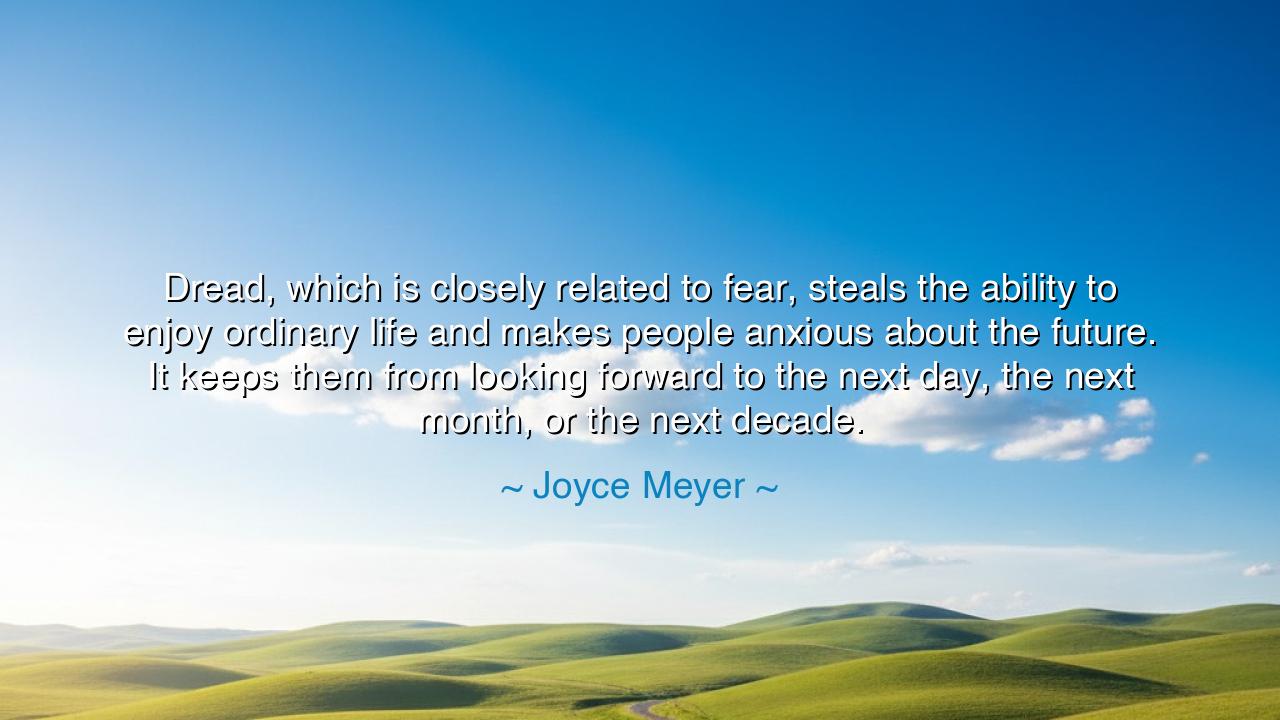
Dread, which is closely related to fear, steals the ability to
Dread, which is closely related to fear, steals the ability to enjoy ordinary life and makes people anxious about the future. It keeps them from looking forward to the next day, the next month, or the next decade.






In the shadowy realm of the human mind, there exists a force that paralyzes the spirit and clouds the clarity of the heart—a force so insidious that it steals the very essence of joy and peace. Joyce Meyer's words, "Dread, which is closely related to fear, steals the ability to enjoy ordinary life and makes people anxious about the future. It keeps them from looking forward to the next day, the next month, or the next decade," capture the destructive nature of this force. Dread, a deeper, more consuming cousin of fear, robs the individual of their ability to embrace the present, to look forward with hope and anticipation to what lies ahead. It creates an invisible chain that binds one to an endless cycle of anxiety and despair.
In ancient times, fear was seen as a great enemy, one that could turn even the bravest warriors into cowards. Yet, the ancients also knew that fear was not merely an external force—it was a force that arose from within, a tempest that could cloud the mind and the heart. Heraclitus, the great philosopher of ancient Ephesus, taught that the world was in a constant state of change and flux, yet it was fear and dread that made men forget their place within that ever-turning wheel. When faced with dread, the warrior could not see beyond the immediate danger, and thus the future was an empty horizon, too far to be hoped for. The future became a place of fear, not opportunity.
Consider the example of Socrates, who faced the ultimate test of fear and dread when he was condemned to death by his fellow Athenians. Socrates could have easily succumbed to the weight of dread and despair, yet he chose to face his fate with courage and resolve. He did not allow the fear of the unknown to steal his ability to live fully in the present moment. Even in the face of death, he remained steadfast in his wisdom, teaching that it is not the fear of the future but the clarity of the present that gives life its meaning. He lived each day in alignment with his values, regardless of what might come.
In the same way, Mahatma Gandhi, a man who led millions in the struggle for India's independence, was no stranger to the power of fear. Yet, Gandhi recognized that to give in to dread was to relinquish the power of self-determination. He famously said, “The enemy is fear. We think it is hate; but, it is fear.” Gandhi understood that the more we succumb to fear, the more we become prisoners of our own minds. Like Socrates, he chose to face adversity with the strength of his convictions, knowing that the power to shape the future lay not in the avoidance of fear, but in the courage to embrace it and move forward with faith in what could be.
Dread distorts the mind, just as a cloud obscures the sky. In its grip, we fail to see the beauty of the present, and the future becomes a shadowed landscape, too bleak to embrace. The ancient stoics, such as Epictetus and Seneca, spoke often of the need to detach from the fears that hold us captive. Epictetus taught that we cannot control the events of the world, but we can control how we respond to them. In other words, while the future is uncertain, it is our attitude toward it that determines whether we live in fear or in peace. Dread is born from attachment to outcomes, and the only true way to free ourselves from it is by embracing uncertainty with equanimity.
The lesson that Meyer imparts is one of deep importance: dread is a thief that steals the joy of the present and prevents us from looking forward to what might be. Fear of the future robs us of the ability to savor the ordinary moments of life, those small treasures that make the days meaningful. We live in a world filled with distractions, uncertainties, and challenges, but if we let dread guide our thoughts, we miss the opportunity to live fully in the now. We become slaves to a future that has not yet come, and in doing so, we forfeit the power we have over the present moment.
To move forward, we must take control of the present, for it is only through the clarity of the now that we can approach the future with hope and purpose. When we release the grip of dread, we allow space for growth, for new opportunities, and for a life lived with meaning. The challenge is not to avoid fear but to see it as what it is—a fleeting shadow that has no power unless we give it life. To live fully, we must step beyond the veil of dread and look toward tomorrow with a heart that is free from anxiety, grounded in the wisdom of the present.
Thus, let us take action. Let us be mindful of the grip of dread and choose to live in the moment, to find joy in the ordinary, and to embrace the unknown with open hearts. The future is not to be feared; it is to be welcomed with the understanding that we can shape it with the choices we make today. As the ancients have taught, let us live not in the shadow of fear but in the light of the present moment, with courage, wisdom, and an unwavering faith in the future we will create.






AAdministratorAdministrator
Welcome, honored guests. Please leave a comment, we will respond soon